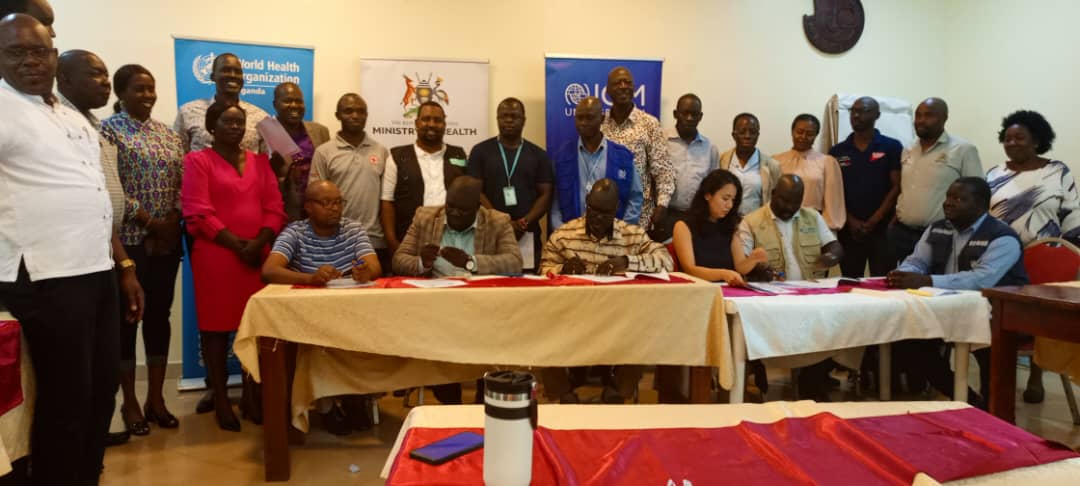By Emelda Siama John
South Sudan and Uganda held a joint cross-border meeting from September 9 to 11, 2025, in Gulu City to address series of emerging and re-emerging disease outbreaks that continue to pose significant challenges to public health. These include polio, yellow fever, Ebola virus disease, Marburg virus fever, Crimean-Congo hemorrhagic fever, Rift Valley fever, and several outbreaks of unknown origin, which have had devastating effects on both local and cross-border communities.
The Resident District Commissioner (RDC) of Amuru District, Oceng Geoffrey Osbon, stressed the importance of promoting the One Health approach, which Uganda has already adopted, and called for enhanced collaboration with South Sudan.
“We are aware that there are many point of entry that are gazetted, but do not have a functional point of entry. That needs to be, when the funds are available, should be operational. Commission of Lamuoke can attest to this fact, that he has a lot of entry without these facilities. And they are gazetted points. And oftentimes, he is himself to see that he supervises most of this work. More especially in the areas of Sairatenya, Madupe, area of Aweno, Rio. All this calls for our attention. I want to request colleagues that we’ll not finish only sitting on the holds here and make decisions. Sometime, we need to behave like doubting pharmacies in the Bible. That we go, we dedicate one day of our meeting to go for a field visit, so that we see and you’ll have a proper reflections of what happened at our point of entry. There, you’ll make decisions that is accurate. We also need to understand key indicators in the international health regulations, so that we know exactly what our mandates are. We have been talking about it here, but it is not visible in our actions always along our points of entry. And also, we have been talking about vaccinations. This is something that we need to robustly handle extensively. Oftentimes, it is travellers, those who use point of entry because of the set of regulations in our countries that you need to give document in order to validate your status of vaccination. That’s when it is a prerequisite commitment and coordinations of most of our activity. It is something that we need to commit ourselves.” said Oceng
Representing South Sudan, the Mayor of Nimule Municipality in Eastern Equatoria State, Caesar Longa Fuli, noted that disease outbreaks such as cholera and Mpox demonstrate the interconnectedness of health security between the two countries. He emphasized the importance of joint action.
“The safety and health of all the travellers, health experts, and personal travelling between our shared borders. We understand that effective collaboration requires an environment of trust and security. My government is dedicated to providing the necessary security and to ensure that our health professionals can travel and work without border to assist in emergencies and share vital resources. The well-being of this dedication expert is paramount to our success. By working together we can protect our people and build a legacy of health and prosperity for generations to come.”
Patrick Louis, the Cross-Border Coordinator for Nimule and Elegu, said the meeting was a follow-up on the implementation of earlier action points aimed at strengthening border health response and promoting the One Health approach, a key factor in preventing disease spread.
“At the border, according to the international regulations, there is supposed to be regular screening for animals, for veins, human beings, and all processes to ensure that there is no importation or exportation of infections.” Patrick said.
The meeting was organized by the Ministries of Health of both countries, in collaboration with the World Health Organization (WHO) and the International Organization for Migration (IOM).
Participants highlighted several contributing factors to the cross-border spread of these diseases, such as increased cross-border trade, the movement of people and animals for commerce, high population density, the impacts of climate change, proximity to disease hotspots like the Congo Basin, and the unique ecological characteristics of the Rift Valley. Authorities emphasized the need for proper public health measures to safeguard regional health security.
Currently, Uganda is responding to an outbreak of Mpox, while South Sudan is dealing with a cholera outbreak both of which have caused significant social and economic disruption on a large scale.
The meeting concluded with a strong commitment from both countries to improve collaboration, strengthen border health systems, and implement coordinated responses to shared public health threats.




